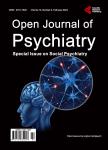Empowerment according to Persons with Severe Mental Illness: Development of the Netherlands Empowerment List and Its Psychometric Properties
Empowerment according to Persons with Severe Mental Illness: Development of the Netherlands Empowerment List and Its Psychometric Properties作者机构:Trimbos Institute Department of Reintegration Utrecht The Netherlands Department of Psychiatry and Psychology School of Mental Health and Neuroscience EURON Maastricht University Medical Centre Maastricht The Netherlands King’s College London King’s Health Partners Department of Psychosis Studies Institute of Psychiatry London UK
出 版 物:《Open Journal of Psychiatry》 (精神病学期刊(英文))
年 卷 期:2017年第7卷第1期
页 面:18-30页
学科分类:1002[医学-临床医学] 100214[医学-肿瘤学] 10[医学]
主 题:Empowerment Psychotic Disorder Recovery
摘 要:Objectives. It is unclear whether and to what extent purportedly empowering practices in mental health care, like rehabilitation programs, recovery-supporting mental health care environments and peer-run services, contribute to the process of empowerment. Several American empowerment questionnaires have been developed in recent years, facilitating the measurement of empowerment outcomes. Given likely major transatlantic cultural differences in a value-sensitive concept such as empowerment, this article describes the development of the Netherlands Empowerment List (NEL) and its psychometric properties. Methods. Patients in Dutch mental health services provided meaning to the empowerment concept from which the NEL was derived. Based on 531 completed questionnaires, analyses in agreement with COSMIN criteria examined aspects of internal consistency, content validity, structural validity, convergent validity, discriminant validity, reproducibility and responsiveness of the NEL. Results. The NEL is a 40-item self-report questionnaire with six subscales: Social support, Professional help, Connectedness, Confidence and purpose, Self-management and Caring community. Internal consistency (Cronbach’s alpha = 0.94), aspects of validity, reproducibility (intraclass correlation = 0.79) and responsiveness were good. Correlation with existing scales was the highest for the Mental Health Confidence Scale (r = 0.78) and the lowest for the Boston Empowerment Scale (r = 0.61). Conclusion. The NEL appears to be a suitable instrument to capture the dimension of empowerment in European mental health settings.



